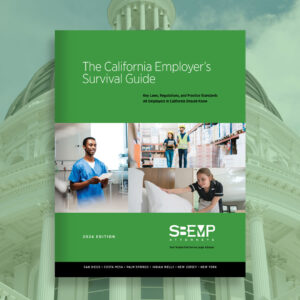Since its enactment in 2004, California’s Private Attorneys General Act (PAGA) has been a significant challenge for employers, often resulting in costly and burdensome litigation.
Before July 1 this year, PAGA allowed employees to collect civil penalties for Labor Code violations on behalf of themselves and other aggrieved employees, essentially stepping into the shoes of the state’s Labor Commissioner.
While intended to bolster labor law enforcement, PAGA has led to over 5,000 lawsuits annually, many for minor, technical violations that did not directly impact employees’ pay. These lawsuits often carried steep penalties – $100 per employee per pay period for initial violations and $200 for subsequent ones – with no cap, generating immense pressure on employers to settle.
In response to widespread criticism and the excessive penalties spurring frivolous litigation, Governor Gavin Newsom signed into law two reform bills, Senate Bill 92 and Assembly Bill 2288, on July 1, 2024. These amendments aim to balance enforcement and fairness, providing significant relief to employers. Here’s what you need to know about these changes.
Key Amendments to PAGA
Early Evaluation and Cure Options: The new amendments introduce procedures allowing employers to address and cure alleged Labor Code violations early in the legal process. Here’s how it works:
- Early Evaluation Conference: Employers with 100 employees or more can request an early evaluation conference and a stay of court proceedings. Both parties submit confidential statements outlining their positions on the alleged violations, potential penalties, and any cure proposals. A neutral evaluator will then facilitate a discussion to explore settlement options and determine if the employer’s efforts to cure are acceptable. If the cure is acceptable, the court could preclude the PAGA claims from proceeding.
- Cure Options for Small Employers: Starting October 1, 2024, employers with fewer than 100 employees can notify the LWDA, upon receiving a PAGA notice, that it would like to cure alleged violations. The LWDA will then coordinate a settlement conference.
Penalty Reforms: The amendments also bring notable changes to the penalty structure under PAGA:
- Good Faith Compliance Caps: Penalties are capped at 15% for employers who demonstrate they took all reasonable steps to comply with applicable laws before receiving a PAGA notice. This cap increases to 30% if these steps are taken within 60 days of receiving the notice.
- Reduced Penalties for Wage Statement Violations: If employees can easily determine the information required in Labor Code section 226 from the wage statement, penalties for these violations are reduced from $100 to $25 per aggrieved employee per pay period.
- Capped Penalties for Isolated Violations: For non-recurring violations that did not extend beyond 30 consecutive days or four pay periods, penalties are capped at $50 per aggrieved employee per pay period.
- Penalty Relief for Weekly Pay Periods: Employers with weekly pay periods will see a 50% reduction in any PAGA penalties, aligning them more closely with those who pay biweekly or semimonthly.
- Increased Employee Share of Penalties: The share of penalties distributed to aggrieved employees increases from 25% to 35%, while the Labor Workforce Development Agency’s (LWDA) share decreases from 75% to 65%.
Stricter Standing Requirements: Previously, PAGA plaintiffs could pursue penalties for alleged violations even if they did not personally experience each alleged violation. Under the new amendments, plaintiffs must have personally experienced each alleged violation within one year prior to the PAGA notice.
Manageability of Claims: To address the complexity and unwieldiness of PAGA cases, courts are now explicitly granted the discretion to determine the manageability of PAGA claims and to limit the evidence presented at trial to ensure effectiveness and efficiency of trial.
What Should Employers Do Now?
To navigate the new PAGA landscape, California employers should take proactive steps to ensure compliance and minimize potential penalties:
- Regularly Review Policies and Practices: Conduct routine payroll audits, update written wage and hour policies, and ensure supervisors are trained on compliance.
- Promptly Address PAGA Notices: Upon receiving a PAGA notice, review it immediately to determine if the early evaluation and cure options can be utilized.
- Document Compliance Efforts: Maintain detailed records of all steps taken to comply with the Labor Code, including audits and corrective actions. This documentation can be crucial in demonstrating good faith efforts and reducing penalties.
- Consult Legal Counsel: Engage with legal experts to navigate the complexities of PAGA and ensure that your compliance efforts are robust and well-documented.
The recent overhaul of California’s PAGA presents both challenges and opportunities for employers. By understanding and leveraging the new provisions, employers can better manage potential liabilities and foster a more compliant and fair workplace environment.
If you need assistance navigating the new PAGA regulations or any other employment law matter, contact Vee Sotelo at (760) 325-2575 or [email protected].

Get a copy of the SBEMP Employers Survival Guide at https://sbemp.com/the-california-employers-survival-guide/




